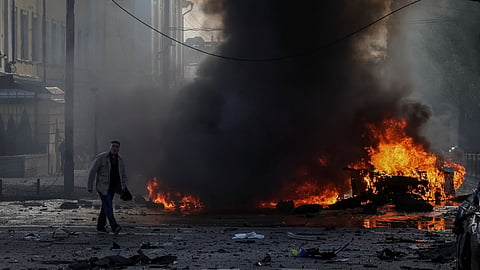

CHENNAI: Europe these days reminds me of the early weeks of the pandemic: We are living with a sense that the end of the world is just around the corner. But this time, anxiety over Russia’s nuclear weapons has replaced talk of the virus. European media is plastered with grim headlines about energy shortages, disruptions and blackouts. Analysts agree that inflation and the escalating cost of living could easily bring millions to the streets in protest. The number of migrants that have come to the European Union this year is already much high than the number that came from Syria in 2015. And the Kremlin’s war machine will only drive the figures higher as the destruction of Ukraine’s infrastructure deprives people there of electricity and water.
Vladimir Putin’s winter is nonetheless unlikely to end Europe’s commitment to Ukraine. Allied governments may change, but sanctions will remain in force. Just look to Italy, where the newly elected far-right government has signed on to the European consensus.
A majority of Europeans are morally outraged by Russia’s brutality. And the recent successes of the Ukrainian Army add hope to the outrage. In fact, as the Ukrainians have made advances on the battlefield, support for them is surging. But the most important factor is, in fact, on the other side of the Atlantic. When Prime Minister Viktor Orban of Hungary, Putin’s closest ally in the European Union, recently proclaimed that “hope for peace is named Donald Trump,” he expressed something that all of Putin’s allies in Europe have realized: Only a change in American policy can change the West’s position on Ukraine. It is America rather than Europe that is the weak link when it comes to sustained support for Kyiv.
But this war will not go on forever. And it’s in the peace, rather than the fighting, that the tensions in Europe will become clear.
There are three distinct camps when it comes to thinking about how this war should end: the realists, the optimists and the revisionists. Representatives from each can be found among politicians and voters in almost all European countries, but they are not equally represented everywhere: In Western and southern Europe the debate is mostly between realists and optimists; in Ukraine and some of the East European countries, it is between optimists and revisionists. Geography and history best explain the differences. West Europeans primarily fear nuclear war. East Europeans fear return of the Russian sphere of influence in their countries in case of Ukraine’s defeat.
The so-called realists believe that Europe’s goal should be that Russia does not win, Ukraine does not lose and the war fails to broaden. Look to the statements of President Emmanuel Macron of France for this view. By this logic, Ukraine should be helped to liberate as much of its territory as possible but a Ukrainian victory must have its limits, because seeking this goal would greatly increase the risk of Russia using tactical nuclear weapons. The most obvious limit, it bears stating, is that Ukraine not go as far as trying to reclaim Crimea, which Russia annexed in 2014.
The realists rightly view the current conflict as more dangerous than the Soviet-American confrontation during the Cold War, because the Cold War was a clash between two forces that both believed that history was on their side. The West now confronts a leader with an apocalyptic mind-set, haunted by the specter of a world without Russia.
Diverging narratives and visions about the desired end of the war are so emotionally and morally charged that any agreement will be painfully complex. But some common framework for a resolution to the war is urgently needed. Without it, Ukrainians’ fear that they will be betrayed by the West and Putin’s fear that Russia will be militarily humiliated fuels escalation to extremes.
Krastev is an expert on international politics
The New York Times
Visit news.dtnext.in to explore our interactive epaper!
Download the DT Next app for more exciting features!
Click here for iOS
Click here for Android